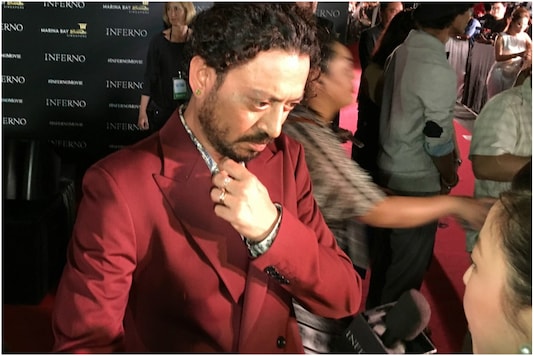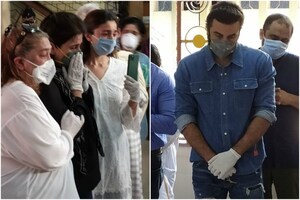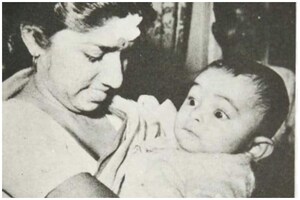The first time I met Irrfan Khan was at the 2010 Abu Dhabi Film Festival where he had come with Paan Singh Tomar. Tigmanshu Dhulia was also there – as the director of the movie in which Irrfan plays an army man who excels in steeple chase, winning accolade after accolade for India. But later, administrative apathy combined with personal losses turns him into a dacoit. "No I am rebel, not a dacoit," he corrected me when I was talking to him at the Festival. Something he tells the journalist in the film too -- out to interview him on a rooftop.
Despite the seriousness of the subject, the sorrow and the frustration a marathon runner faces after he is cheated out of his land and the powers that be does precious little to help him, Khan's Tomar manages to infuse a sense of humour into his performance. The scene on the terrace is a classic example where he first offers food to the scribe, but at the last minute takes it away saying that the man could skip a meal - since he was so fat. And there is just one chair on which Tomar sits, and when he asks the journalist to sit, he is confused. On the ground, Tomar tells him, and as the interviewer squirms, and the episode is more amusing than anything else.
Khan said during the Abu Dhabi chat that in the case of Phoolan Devi and Tomar, it was the system that forced them into crime. Phoolan was a poor Dalit girl exploited by upper castes, till she was raped and ravished, a humiliation that blinded her to reason. With Tomar, it was different. The police stood as mute spectators while his family was abused, his land taken away, his crops destroyed, and his meritorious past as a star sportsman in the Indian Army merely jeered at by the administration. Tomar does resist taking up the gun till he is pushed to the precipice, and when he does that there is no stopping him. Like the sport, Tomar said in the movie, he would only stop at the finishing line. And that line is one that precariously separates Tomar's life and death.
Unfortunately, Paan Singh Tomar could not find a distributor in India, and it took two years for that to happen. Later, Irrfan would tell me that it was my article on the movie which he sent to a few people that made them take note of it.
Irrfan never forgot that, and some years later at Cannes, he mentioned this again – not to me but to my son, who had accompanied me to the Festival that year. As we passed one of the cinema pavilions on the Croisette (Cannes' beach front), he spotted us and came out, a beedi in hand. And believe it or not, he had a long conversation with my son when he mentioned about my role.
Maybe he was kind, I would never know, but he was disarmingly simple. I could never think of another celebrity who would have walked out of the pavilion to share a few thoughts. And long after that, he would always ask me about my son, and this seemed incredible. He loved people and understood their importance in life.
For Irrfan, there was no looking back after Paan Singh Tomar, and Khan had played a million different roles (so to say in a manner of speaking), each time disappearing into them in an almost magical way. As a cop in Danny Boyle's Slumdog Millionaire as well as in the Angelina Jolie-starrer, A Mighty Heart, a Shakespearean schemer in Vishal Bharadwaj’s Maqbool, a ghost in Haider and an ageing loverboy in Ritesh Batra’s The Lunchbox, Irrfan is a performer par excellence.
Outside India, he might not have got the kind of meaty roles he did at home, but however small a part was, he made it appear magical. I never liked the Angelina Jolie-starrer, A Mighty Heart, but Irrfan as a Pakistani cop remained etched in memory. Even today, it does. I did not like Danny Boyle's A Slumdog Millionaire, which I felt celebrated India's grinding poverty. But Irrfan was lovely – again as a cop trying to make sense out of the boy's remarkable victory in the game of quiz.
Playing parts in Vishal Bharadwaj's Maqbool (a take on Shakespeare's Macbeth) and Haider (Hamlet), Irrfan was striking. In Maqbool, he brought the dilemma of a man who was pushed into killing his mentor, a father figure. In Haider, he was the ghost, and what a ghost.
As Ashoke Ganguli in Mira Nair's celluloid version of Jhumpa Lahiri's novel, The Namesake, he was every inch the immigrant desperately seeking a place among New Yorkers. He was pairing with Tabu again after Maqbool. In an interview he said, "You know when we met for the workshop before shooting 'Maqbool' I was really apprehensive. Even on the sets we met almost as strangers. When we finally started shooting I wanted to sit with her for 10 minutes holding her hand just to establish a comfort level. That never happened. First we shot the poignant climactic sequence. The way she reacted to me in that scene convinced me that we were like a nut and bolt on screen. She became a part of me and I part of her. My love for her character possessed me. During her death scene, I achieved a mental state that had prompted me to become an actor in the first place." In The Namesake, Irrfan took his acting to a still higher plain.
And to think, Irrfan was once considered a sex symbol. People who saw him in London after The Warrior, which, opened in 2001, called him a sex god, and this adulation may not have catapulted him into mid-air, but certainly pumped the essential vitamins into his psyche to delete that impression.
Much, much later, he remained humble and shy in an endearing sort of way. Unlike so many of our stars, he was not brash and arrogant. A human being who never forgot his roots in Rajasthan. Coming from a Nawabi family, his father strongly disapproved of cinema. "He called it naach-gaana!"
Irrfan must have held that description close to his heart, and he never let his performances slip into the usual melodramatic song-and-dance tamasha.
There is yet another quality about Irrfan that I prize. He had this phenomenal ability to take criticism. I remember I had written in one of my columns that The Lunchbox was not quite suitable as India's contribution to the Oscars. When met later at a Festival lunch, he told his wife, who was also there, "He had written that The Lunchbox was not good for the Academy Awards." That is really bad, his wife quipped. "No, no, such things happen, and I think he has a right to his view," he said.

I was amazed to learn that he was following my writings. And he mentioned one where I had said that he must know the language of a film to be able to emote with conviction. "I quite agreed with what you wrote," Irrfan had the disarming humility to accept my point of view. This is what I had penned some time ago: "So, I was quite disappointed to note that one of India's finest actors, Irrfan, when asked in a recent interview whether he would like to work in Tamil cinema said that he 'can work in any industry' provided he liked the script and the story. He cited the example of his recent work, Doob or No Bed of Roses, a Bangladeshi (Bengali) film. I watched that some weeks ago. Now, I have seen Irrfan in many other movies, but I did find a wee bit of difference in his acting in Doob. Obviously, he is not familiar with Bengali, although his wife speaks the language. I found something lacking in his performance. It did not display the same kind of feel which I have seen in his earlier works like The Lunch Box, Qissa, Paan Singh Tomar, Piku, Haider and so on. I can only put my finger here on his inability to comprehend the Bengali language”.
Finally, I would always regret that I missed an interview with him on the sets of Anup Singh's The Song of Scorpions. Shot in the deserts of Rajasthan, I was to travel there, but I was denied permission by the movie's producer. I wish I had asked Irrfan straight instead of following protocol. Another journalist got the interview, and as Anup said, that scribe had approached Irrfan directly. “Do not worry Gautaman, I will make it up," Anup had reassured me. But this was never to happen.
Follow @News18Movies for more
















